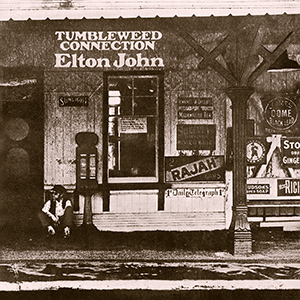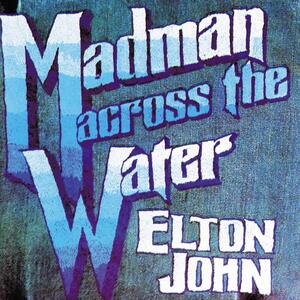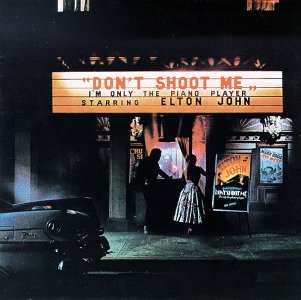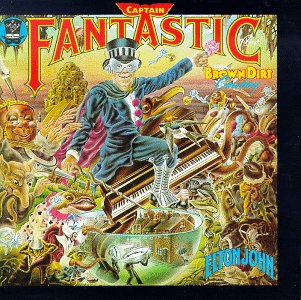| Play On | ||||
|---|---|---|---|---|
 | ||||
| Studio album by | ||||
| Released | 1983 | |||
| Recorded | 1982 | |||
| Studio | Maison Rouge, London | |||
| Genre | Rock | |||
| Label | EMI | |||
| Producer | Gus Dudgeon | |||
| John Miles chronology | ||||
| ||||
Play On is the sixth solo album by John Miles released in 1983 via EMI label.
| Play On | ||||
|---|---|---|---|---|
 | ||||
| Studio album by | ||||
| Released | 1983 | |||
| Recorded | 1982 | |||
| Studio | Maison Rouge, London | |||
| Genre | Rock | |||
| Label | EMI | |||
| Producer | Gus Dudgeon | |||
| John Miles chronology | ||||
| ||||
Play On is the sixth solo album by John Miles released in 1983 via EMI label.
EMI promised that Miles would use a top producer and top session musicians for his second album for EMI. [1]
Eventually they chose Gus Dudgeon who had worked with artists like Elton John, Chris Rea and Elkie Brooks. Originally, the album was planned to be released in 1982, but because Dudgeon was not available at the time, the release was delayed. [1]
It was also the first time that drummer Barry Black and bassist Bob Marshall were not used on the album (although Marshall still wrote the songs with Miles). Instead they were replaced by session musicians. "The Right to Sing" was the first single released from the album and was written about the fact that record companies wanted to decide which songs Miles had to release and which direction he had to take. [1]
Another single, the catchy track "Song For You" became a small worldwide hit and was used as a soundtrack in TV commercials for cigarette brand "Hollywood" in Brazil and few other countries.
"That's Rock 'n' Roll" was left off the album because it was too different, and was subsequently released as a B-side. [1]
"Carrie" was covered by The Hollies on the b-side of the 1988 re-release of their cover version of He Ain't Heavy, He's My Brother. John Miles sang backing vocals on it.
On 23rd April 2024, which would have been John’s 75th birthday, his official Facebook page announced that Play On would be available for the first time on CD as part of a 3 CD set covering his albums from 1983 to 1993. The release date was set as 19 July 2024 & in addition would include the Transition & Upfront albums together with liner notes and all singles both A’s & B’s. A few days later Cherry Red released more information. https://www.cherryred.co.uk/john-miles-the-albums-1983-93-3cd-box-set
All songs written by Bob Marshall and John Miles

Elton John is the second studio album by English singer-songwriter Elton John. It was released on 10 April 1970 through DJM Records. Including John's breakthrough single "Your Song", the album helped establish his career during the rise of the singer-songwriter era of popular music.

Tumbleweed Connection is the third studio album by English singer-songwriter Elton John. It was recorded at Trident Studios, London, in March 1970, and released in October 1970 in the UK and January 1971 in the US. It is a concept album based on country and western and Americana themes. All songs are written by John and Bernie Taupin, with the exception of "Love Song" by Lesley Duncan.

Madman Across the Water is the fourth studio album by English musician Elton John, released on 5 November 1971 by DJM and Uni Records. The album was his third album to be released in 1971, at which point John had been rising to prominence as a popular music artist. John's first progressive rock album, Madman Across the Water contains nine tracks, each composed and performed by John and with lyrics written by songwriting partner Bernie Taupin. Yes keyboardist Rick Wakeman plays Hammond organ on two songs.

Honky Château is the fifth studio album by English musician Elton John. It was released on 19 May 1972, and was titled after the 18th century French chateau where it was recorded, Château d'Hérouville. The album reached number one on the US Billboard 200, the first of John's seven consecutive US number one albums.

Don't Shoot Me I'm Only the Piano Player is the sixth studio album by English musician Elton John. Released in January 1973 by DJM Records, it was the first of two studio albums he released in 1973, and was his second straight No. 1 album in the US and first No. 1 album in the UK.

Caribou is the eighth studio album by English musician Elton John, released on 24 June 1974 by MCA Records in the US and on 28 June by DJM Records in the UK. It was his fourth chart-topping album in the United States and his third in the United Kingdom. The album contains the singles "Don't Let the Sun Go Down on Me", which reached number 16 in the UK Singles Chart and number two in the US, and "The Bitch Is Back", which reached number 15 in the UK and number four in the US. Both singles reached number one in Canada on the RPM 100 national Top Singles Chart, as did the album itself.

Captain Fantastic and the Brown Dirt Cowboy is the ninth studio album by English musician Elton John. The album is an autobiographical account of the early musical careers of Elton John and his long-term lyricist Bernie Taupin. It was released in May 1975 by MCA Records in America and DJM in the UK and was an instant commercial success. The album was certified gold before its release, and reached No. 1 in its first week of release on the US Billboard 200, the first album to achieve both honours. It sold 1.4 million copies within four days of release, and stayed in the top position in the chart for seven weeks.

Blue Moves is the eleventh studio album by English musician Elton John. It was released on 22 October 1976 through John's own Rocket Record Company, alongside MCA Records in certain countries. John's second double album, it was recorded at EMI Studios, Brother Studios, Eastern Sound and Sunset Sound Recorders, and was his last to be produced by longtime collaborator Gus Dudgeon until Ice on Fire (1985). Additionally, the album would be the last collaboration between John and lyricist Bernie Taupin for the next few years until a partial resumption of their working partnership with 21 at 33 (1980).

A Single Man is the twelfth studio album by English musician Elton John. Released in 1978, it is the first album for which Gary Osborne replaced Bernie Taupin as lyricist. It is also the first of two John albums that, on the original cut, have no tracks co-written by Taupin.
Leather Jackets is the twentieth studio album by English musician Elton John. Recorded at Sol Studios in England and Wisseloord Studios in the Netherlands, it was released in 1986 and was his first album not to have any top 40 singles in either the US or the UK since 1970's Tumbleweed Connection, which had no singles released from it. It is also one of his lowest charting studio albums in the United States, peaking at number 91 on the Billboard 200 chart.
Live in Australia with the Melbourne Symphony Orchestra is the twenty-eighth official album release for English musician Elton John, released in 1987. It is a live album recorded at the Sydney Entertainment Centre on 14 December 1986 with the Melbourne Symphony Orchestra.

Deltics is the second studio album by British singer-songwriter Chris Rea. It was released in 1979 on Magnet Records. The album is named after the East Coast rail network's Deltic-class locomotives that were used in the 1960s and 1970s. The album is Rea's first album to chart on the UK Albums Chart, peaking at number fifty-four. The single "Diamonds" peaked at number 44 on both the UK Singles Chart, and Billboard Hot 100, where it charted for eight weeks. The B-side of this single, "Cleveland Calling", was not included on the CD reissue of the album. The album producer Gus Dudgeon had made several early albums with Elton John.

That's The Way God Planned It is the fourth studio album by American musician Billy Preston, released in August 1969 on Apple Records. The album followed Preston's collaboration with the Beatles on their "Get Back" single and was produced by George Harrison. The title track became a hit in the UK when issued as a single. Aside from Harrison, other contributors to the album include Keith Richards, Eric Clapton, Ginger Baker and Doris Troy.

No Frills is the sixth studio album by American singer Bette Midler, released on Atlantic Records in 1983. No Frills was Midler's first studio album in four years, following the movies The Rose, Divine Madness! and Jinxed!. The rock and new wave influenced album was produced by Chuck Plotkin, best known for his work with Bob Dylan and Bruce Springsteen, and included three single releases; the ballad "All I Need to Know", a cover of Marshall Crenshaw's "You're My Favorite Waste of Time" and Midler's take on the Rolling Stones song "Beast of Burden".

Lil' Beethoven is the 19th album by the American rock band Sparks, released on November 26, 2002. The album was a radical musical departure compared to their previous works. The band only used strings, piano, and voices but sporadic drums: the result was both classical and pop music.
Tom Howard was an American pianist, musical arranger and orchestral conductor.

Tommy is a soundtrack album by The Who with contributions from numerous artists. The soundtrack was used in the 1975 Tommy film that was based on the original album that was released by The Who in 1969. Pete Townshend oversaw the production of this double-LP recording that returned the music to its rock roots, and on which the unrecorded orchestral arrangements he had envisaged for the original Tommy LP were realised by the extensive use of synthesiser.
The Tour De Force was a concert tour by English musician and composer Elton John. The tour consisted in 26 shows scheduled in Australia accompanied by the Melbourne Symphony Orchestra.

Trevor Hall is the sixth album by Trevor Hall. The album spawned two singles, "Unity" and "Volume". It is his first major-label release since he was dropped from Geffen Records. The album features two songs that had previously been recorded for his unreleased album The Elephant's Door. "The Lime Tree" and "31 Flavors" were reworked and re-recorded, with "The Lime Tree" featuring additional vocals by Colbie Caillat. The album was produced by Marshall Altman, who also performed on several tracks. After the first week of the album's release, it had debuted at No. 199 on the Billboard 200 album chart, also debuting at No. 7 on the Billboard Heatseeker's chart. Trevor was only 22 when the album was released.

Bish is the second album by singer/songwriter Stephen Bishop. The lead single, "Everybody Needs Love", peaked at No. 32 on the Billboard Hot 100 singles chart. and number five on the U.S. Adult Contemporary chart. It did better in Canada, reaching No. 29 and peaking at number two on the Canadian Adult Contemporary chart. The album itself rose to No. 35 on the Billboard pop albums chart.